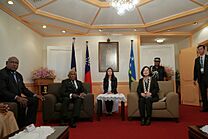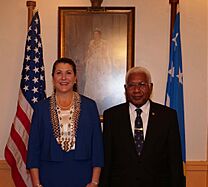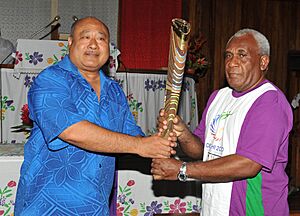Governor-General of Solomon Islands facts for kids
Quick facts for kids Governor-General of Solomon Islands |
|
|---|---|

|
|

Badge
|
|
| Viceroy | |
| Style | His Excellency |
| Residence | Government House, Honiara |
| Appointer | Monarch of Solomon Islands
on the nomination by the National Parliament
|
| Term length | Five years, renewable once |
| Constituting instrument | Constitution of Solomon Islands |
| Formation | 7 July 1978 |
| First holder | Sir Baddeley Devesi |
| Salary | 130,000 SBD annually |
The Governor-General of Solomon Islands is a very important person in the country. They represent the King of Solomon Islands, who is currently King Charles III. Think of them as the King's official stand-in for Solomon Islands.
The Governor-General is chosen by the King. But first, the Parliament in Solomon Islands votes to decide who they want for the job. Once chosen, the Governor-General helps with many important tasks. These include picking government ministers, judges, and ambassadors. They also approve new laws passed by Parliament and announce when elections will happen.
The Governor-General usually stays neutral in politics. They follow a system called the Westminster system. This means they mostly act on the advice of the Prime Minister. The Governor-General also has a special role in ceremonies. They host events at their official home, Government House, in Honiara. They also give awards to people who have done great things for Solomon Islands. When they travel, they represent the country and its King.
Governors-General serve for five years. They can be chosen for a second term. Since July 7, 2024, Sir David Tiva Kapu has been the Governor-General. The role was created on July 7, 1978. This was when Solomon Islands became an independent country. Since then, eight people have held this important position.
Contents
How the Governor-General Is Chosen
In Solomon Islands, the way the Governor-General is chosen is a bit different from other countries that have the King as their head of state. Usually, the Prime Minister suggests a person. But here, the country's Parliament votes to nominate someone.
The King then officially appoints the person chosen by Parliament. This is stated in Section 27 of the Constitution of Solomon Islands. It says there will be a Governor-General. This person is appointed by the Head of State (the King) based on Parliament's choice. They represent the King in Solomon Islands.
A Governor-General serves for five years. They can be chosen again for one more term.
Taking the Oath
Before starting their job, the Governor-General takes a special oath. This is a promise to serve the King and the people of Solomon Islands. The oath says:
"I, (name), do swear that I will well and truly serve His Majesty King Charles III, His Heirs and Successors, in the office of Governor-General of Solomon Islands. So help me God."
When the Governor-General Can Be Removed
The King can remove the Governor-General from office. This can happen if they misbehave or for other reasons decided by Parliament. But Parliament must agree to this with a vote of at least two-thirds of its members.
If the Governor-General's job becomes empty, for example, if they pass away or are removed, the Speaker of the National Parliament of Solomon Islands steps in. The Speaker acts as Governor-General until a new one is appointed. If the Speaker cannot do this, then the Chief Justice takes over.
What the Governor-General Does
Solomon Islands is one of 15 countries that share the same King. Since the King lives outside Solomon Islands, the Governor-General's main job is to do the King's duties. They carry out their tasks for the government of Solomon Islands on behalf of the King.
The Governor-General's powers come from the Constitution of Solomon Islands. Sections 27, 28, and 29 explain their roles.
Helping with Laws and Government
The Governor-General can dissolve Parliament early. This means ending a parliamentary term before its four years are up. This happens if most members of Parliament vote for it. The Governor-General also sets the date for the next general election. This election must happen within four months of Parliament being dissolved.
After an election, the Governor-General calls a meeting of Parliament. This meeting is to elect the new Prime Minister. Once the Prime Minister is chosen, the Governor-General appoints the other government ministers. They do this based on the Prime Minister's advice.
The Prime Minister must keep the Governor-General informed about how the government is running. They also provide any information the Governor-General asks for.
The Governor-General also approves laws passed by Parliament. This is called giving royal assent. They also issue rules and announcements under existing laws. They appoint state judges, ambassadors to other countries, and other senior government officials. All these actions are done on the advice of the Cabinet.
The Governor-General can also start special investigations called Royal Commissions of Inquiry. They approve many other decisions made by ministers, like agreeing to treaties with other countries.
The Prime Minister can be removed from office by the Governor-General. This happens if Parliament passes a no-confidence motion. This means most members of Parliament no longer support the Prime Minister. The old Prime Minister stays in office until a new one is elected. If the Prime Minister passes away while in office, the Governor-General chooses another minister to act as Prime Minister. This happens after talking with the other ministers.
Ceremonial Duties
The Governor-General has many ceremonial duties. They officially open new sessions of Parliament. They do this by giving a speech called the Speech from the Throne. They also welcome leaders from other countries who visit Solomon Islands. And they receive official papers from foreign diplomats.
The Governor-General also gives out awards to Solomon Islanders. These awards are for great service to the community or for brave actions.
Community Involvement
The Governor-General is a leader in the community. They support many different groups. These include charities, sports clubs, and cultural organizations. They attend events all over the country.
They also help to bring Solomon Islanders together. They encourage and represent the things that unite everyone in the country.
Special Benefits
Salary
The Governor-General receives a yearly salary of 130,000 SBD.
Former Governors-General also receive a pension. This pension is 60% of what the current Governor-General earns.
Symbols of Office
The Governor-General has their own special flag. It is blue and features a lion and a crown. It also has "Solomon Islands" written on a two-headed frigatebird. This flag is flown at buildings and places where the Governor-General is present.
Official Home
Government House in Honiara is the official home of the Governor-General.
When Governors-General retire, they are given an official home to live in for free. The government also pays for their water, gas, and electricity.
List of Governors-General
Here is a list of the people who have served as Governor-General of Solomon Islands since it became independent in 1978.
Denotes Acting Governors-General
| No. | Portrait | Name (Birth–Death) |
Term of office | Monarch (Reign) |
||
|---|---|---|---|---|---|---|
| Took office | Left office | Time in office | ||||
| 1 |  |
Sir Baddeley Devesi (1941–2012) |
7 July 1978 |
7 July 1988 |
10 years |  Elizabeth II  (1978–2022) |
| 2 |  |
Sir George Lepping (1947–2014) |
7 July 1988 |
7 July 1994 |
6 years | |
| 3 |  |
Sir Moses Pitakaka (1945–2011) |
7 July 1994 |
7 July 1999 |
5 years | |
| 4 |  |
Sir John Lapli (1955–2025) |
7 July 1999 |
7 July 2004 |
5 years | |
| 5 |  |
Sir Nathaniel Waena (born 1945) |
7 July 2004 |
7 July 2009 |
5 years | |
| 6 |  |
Sir Frank Kabui (born 1946) |
7 July 2009 |
7 July 2019 |
10 years | |
| 7 |  |
Sir David Vunagi (1950–2025) |
7 July 2019 |
7 July 2024 |
5 years | |
 Charles III  (2022–present) |
||||||
| 8 |  |
Sir David Tiva Kapu (born ?) |
7 July 2024 |
Incumbent | 1 year, 235 days | |
See also
 In Spanish: Gobernador general de las Islas Salomón para niños
In Spanish: Gobernador general de las Islas Salomón para niños
- List of resident commissioners and governors of the Solomon Islands, for leaders before Solomon Islands became independent.
 | Sharif Bey |
 | Hale Woodruff |
 | Richmond Barthé |
 | Purvis Young |




